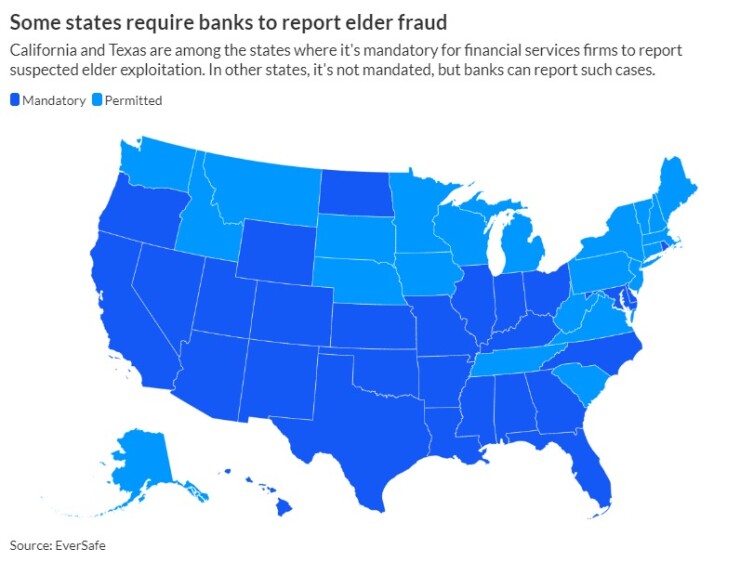
In an elder fraud case David Burroughs worked on earlier this year, a widow received a call two weeks after her husband's death from someone who claimed to be from the Social Security Administration.
"They said she owed $85,000 and if she didn't get that to them, they were going to have her arrested," said Burroughs, a partner at legal advisory firm StoneTurn and a former FBI investigator who does pro bono work with elder fraud victims. "She went right down to the bank, withdrew $85,000 and sent it."
About a week later, she got another call from someone using a slightly different scenario (it may have been the same fraudster), again demanding cash. The woman said she only had $2,000 in her checking account. The caller insisted she withdraw it and give it to a messenger they sent to her house to pick it up. She did so.
"Here she is, grieving the loss of her husband," Burroughs said. "I have to believe these guys found her in the obituaries. Some people are just so vulnerable and these people exploit it, and it just infuriates me."
More than 8.68 million incidents of elder fraud occur each year in the U.S. with an average loss per case of $20,015, adding up to $113.7 billion per year, according to the Connecticut governor's office. In April, the Treasury Department's Financial Crimes Enforcement Network reported that it had examined Bank Secrecy Act filings between June 15, 2022, and June 15, 2023, that involved elder financial exploitation. It found 155,415 cases worth about $27 billion.
Some states have responded by proposing or passing laws forcing banks to do more to help victims. These laws either permit or require financial institutions to report suspected fraud to adult protective services and law enforcement agencies, to hold or block transactions that appear to be be part of an elder fraud scheme and to train employees and educate older customers about the signs of fraud.

Some states draw the "elder" line at 60 years of age or older, some at 62 or 65. All are addressing the problem of fraudsters taking advantage of people who may be lonely and may be in cognitive decline.
Advances in technology and the digital divide have worsened the risk of elder fraud, according to Jennifer Pitt, fraud prevention consultant for Voice Against Fraud. She is also a former financial crimes detective.
"Seniors who are 60, 70 years old or older may not have grown up with the technology, so they're essentially playing catch up, trying to not only learn how to use the technology" but also how to identify deep fakes, she said.
Using generative AI, scammers can capture just two seconds of a voice and use it to say anything, Pitt said. They're also getting bolder about threatening to do things like kill people's families, she said.
"When you have scams where they're talking about hurting your family, and it sounds legitimate, that fear response in people's brains automatically kicks in," Pitt said. "The brain basically is saying, 'get rid of that fear as soon as possible.' And with scams, that ultimately means giving the money and appeasing that scammer."
AI is also helping scammers mass-produce their schemes, she said.
"Whereas before they would send out some emails to a group of people, now they can teach a program to teach itself, essentially, to write these scam emails and scam texts," Pitt said.
What the laws require
An elder fraud protection bill proposed by California Sen. Bill Dodd — SB 278 — appears to go the furthest. Under the bill, which would amend the state's existing Elder Abuse and Dependent Adult Civil Protection Act, victims of financial elder abuse can hold financial institutions accountable when they reasonably should have known of the fraud but assisted in the transfer anyway. The bill passed the California Assembly Judiciary committee in June.
"Unfortunately, our current financial elder abuse statute is not as clear as it should be on what steps a bank or credit union should take to protect against senior scams," Sen. Dodd, D-Napa, said in a statement. "My bill will help protect seniors by enacting a comprehensive, up-front scam prevention policy for California banks and credit unions."
The bill would require banks and credit unions to set up an emergency financial contact program for covered account holders (customers over 60 and dependent adults). If the financial institution reasonably suspects a transaction requested by an older customer is the result of financial abuse, it would be required to notify a joint account holder or an emergency financial contact. Banks and credit unions would also be required to delay, by at least three business days, any transaction that they suspect is the result of financial abuse. They would be absolved of any liability for delaying or refusing such a transaction.
Banks that fail to take these steps could be subject to a civil penalty of up to $5,000 and be liable for up to three times actual damages, where there is a "preponderance of evidence" that they violated this law.
Connecticut passed a law in 2023 that took effect in July, Public Act 23-161, that's also meant to protect seniors from suspected cases of financial fraud, scams and exploitation.
The law authorizes financial institutions to temporarily suspend or hold transactions on accounts of customers over the age of 60 if there is a reasonable suspicion of financial exploitation, for up to 45 days. Those that act in good faith when suspending or holding a transaction will be immune from liability that might otherwise come from denying immediate access to an account holder's money. The financial institution is expected to disclose the suspected abuse to the Connecticut Department of Banking or the Connecticut Department of Social Services, which will investigate the report and refer it to law enforcement if appropriate.
Challenge of detecting elder fraud
Many banks address the problem of elder fraud by training branch staff to look for signs of an older customer being exploited. Liz Loewy, co-founder and chief operating officer of EverSafe, a fintech that monitors bank accounts for signs of elder fraud, agrees training is useful, and praises AARP's BankSafe training program. But she also thinks training isn't enough.
"As someone who has been in the field for decades, I am quite sure that everyone knows there's no gazillion-dollar award being offered by someone in Russia or India or a Nigerian prince," she said. "So I honestly wish that they would be doing more than training."
Krish Swamy, Dan Jermyn and others on a just-released AI 100 list say they expect investment in AI to keep increasing.
Because most transactions happen through apps or online, banks have to use fraud detection software to monitor transactions for signs of possible elder abuse – anomalies or patterns that indicate something is amiss. For instance, a person who hasn't done a wire transfer in 40 years suddenly sending money to people could be a red flag, or someone who has never used an ATM doing a burst of ATM transactions.
Banks need help understanding what the transaction and behavior red flags are, Pitt said, "to get past that concern about 'why are you holding my money?' They're going to have to articulate, 'this is what I saw.' Right now they can't do that," she said. "Essentially you have banks that are letting every transaction through and almost turning a blind eye."
Elder fraud can be hard to spot. In a case Burroughs worked on earlier this year, a bank representative originally notified a family that there were some large withdrawals on their father's account, and they just wanted to make sure everything was OK.
"That triggered them to look more closely, and then they realized they had a problem," he said. An investigation uncovered a romance scam that had defrauded several men. Over the course of a year, the FBI found 16 victims and arrested two fraudsters behind the scam.
Victims themselves are typically reluctant to report fraud. Some older people fear losing their independence, and worry that being a scam victim will be considered a sign of cognitive impairment, Burroughs said.
"They sometimes get defensive, because they're sensitive about how they're perceived and they're going to think, 'they're going to put me in a nursing home.'" This delays reporting, which makes it more difficult for law enforcement to act, he said.
Victims of romance scams are often people who recently lost a spouse and are lonely and vulnerable to someone who shows them attention, Burroughs said.
"All of a sudden, you believe with your heart and not your head that this is real," he said. "Emotionally, that tends to desensitize the intellectual assessment because you want this to work out." Romance scam victims are often too embarrassed or ashamed to report their losses.
Sometimes the person taking advantage of an older customer is a family member. In such cases, victims often don't report because they don't want to have an awkward conversation with a relative or rat them out to their banker.
"They feel it'll get resolved, or maybe I have enough money, I can afford to lose this right now, just to keep the peace," Burroughs said.
Victim blaming is another issue, according to Pitt.
"Victims are not going to report [elder fraud] if they feel like they're being blamed," Pitt said. "When financial institutions won't reimburse victims because they were the ones who authorized it, or in the news we have, well, how could you have fallen for that, nobody's going to report it."
Reporting suspected fraud
More than half of U.S. states require banks, credit unions and investment firms to report suspected elder fraud cases to adult protective services, Loewy said.
"In every state there's an Adult Protective Services department, and they are the savior for the client who is suspected to be exploited, the vulnerable adult," she said. "For banks, they're the organization that gets something done."
EverSafe worked with the National Adult Protective Services Association to create a portal called
In some states, including Maryland, if a bank has reason to believe an older, vulnerable customer is at risk and sends case information including account records to Adult Protective Services, it has immunity from lawsuits from customers that think their privacy has been violated. Until recently, Loewy said, banks were reluctant to share bank records, for fear of such lawsuits.
In a similar vein, some states have given banks permission to release account information to law enforcement before going through the subpoena process, to speed up investigations, without having to worry they'll be sued.
Burroughs is in favor of this, "especially now that I don't have subpoena power like I did when I worked for the FBI," he said. "I understand the need for privacy. But at the same time, considerations have to be made when someone's being victimized that there can be more transparency and an exchange of information to try and put the fire out."






